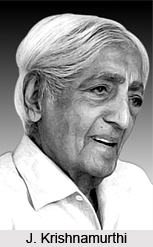 J. Krishnamurthi was born on May 12th, 1895 in Madanapalle in Andhra Pradesh. He spoke and wrote on psychological revolution, nature of the mind, meditation, human relationships and brought about positive change in society. He stressed the need for a revolution in the psyche of every human being.
J. Krishnamurthi was born on May 12th, 1895 in Madanapalle in Andhra Pradesh. He spoke and wrote on psychological revolution, nature of the mind, meditation, human relationships and brought about positive change in society. He stressed the need for a revolution in the psyche of every human being.
He was born into a Telugu Brahmin family to Jiddu Narayaniah and Sajeevamma. In his adolescence he was under the tutelage of Annie Besant and Leadbeater. He believed in no nationality, caste, religion, or philosophy, and spent the rest of his life travelling the world. He authored several books. He was nurtured by members of the Theosophical Society in Adyar. He was privately tutored at the Theosophical compound in Chennai. He was the head of the organization called the Order of the Star that was established by Theosophical society.
J. Krishnamurti experienced a lot of mystical experiences through out his entire life and which brought about a huge and deep transformation in him. The experiences also gave him a new vision of life and in his later life; he disconnected himself from all types of organized religions and ideologies. He decided to embark on his own solitary mission and he always preferred to meet and talk to the common people.
J. Krishnamurti had the credit of giving an entirely new meaning and content to religion and he did so by pointing to a way of life that excelled all the organized religions. He gave the declaration that his only concern was to set the human beings absolutely and unconditionally free. He died on 17th February 1986.
This article is a stub. You can enrich by adding more information to it. Send your Write Up to content@indianetzone.com




















